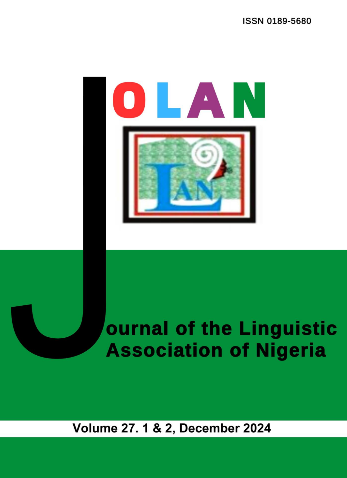A structural analysis of the Igbo comparative ka and its grammaticalised status
Keywords:
Grammaticalisation, Igbo comparative, Verb serialisation, Complex predicate, ComparisonAbstract
Over the years, the study of Igbo comparative markers has received very little attention in morphosyntax research. In a few existing literature where they are mentioned in passing, scholars unanimously project the verb ‘ka’ ‘surpass’ as a comparative marker. Little or no attempt has been made to investigate its varying contexts of occurrence and its gradual transition from a purely lexical to a grammaticalised function. This work, therefore attempts to bridge the existing gap in the extant literature by examining extensively, the Igbo comparative, ka and its grammaticalised status. We adopt the parameters of grammaticalisation in measuring the autonomy and grammaticalised status of the comparative verb ka. Data for this study were obtained from both primary (introspective and field data) and secondary sources (corpus data) of the standard Igbo and other varieties of Igbo such as the Awka dialect.
References
Dixon, R.M.W. (2008). Comparative constructions: A cross-linguistic typology. Studies in Language, 32(4), 787-817.
Emenanjo, E. N. (1978). Elements of modern Igbo grammar. A descriptive approach. University Press Limited.
Emenanjo, E N. (2015) A contemporary grammar of Igbo. Grand Orbit.
Ezenwafor, C I., and Ezenwafor, C.A. (2015). Verbs of quality in Igbo: A semantic and morphosyntactic characterization. Igbo Language Studies Series, 1, 9-22
Haspelmath, M. (1999). Why is grammaticalization irreversible? Linguistics, 37(6), 1043-1068.
Heine, B. (1997). Cognitive foundations of grammar. Oxford University Press.
Heine, B. (2003). Grammaticalization. In B. Joseph and R. Janda (Eds.), Handbook of historical linguistics. (pp 573-601). Blackwell.
Heine, B., Ulrike C., and Friederike H. (1991). Grammaticalization: A conceptual framework. University of Chicago Press.
Kurylowciz, J. (1965). The evolution of grammatical categories. Diogenes, 13(51), 55-71.
Lehmann, C. (2004). Comparison and gradation. In G. Booij, C. Lehmann, J. Mugdan & S. Skopeteas (Eds), Morphology. An international handbook on inflection and word formation. (pp 1212-1220). De Gruyter.
Lehmann, C. (2015). Thoughts on grammaticalization. Classics in linguistics Language Science Press.
Lord, C. (1975). Igbo verb compounds and the lexicon. Studies in African Linguistics 6, 23-48
Maduka-Durunze, O. (1990). Igbo adjectives as morphophonologized relatives. Studies in African Linguistics, 21, 237-250
Stassen L. (1985). Comparison and universal grammar. Basil Blackwell.
Stassen, L. (2013). Comparative constructions. In: M.S. Dryer & M. Haspelmath (Eds.), The world atlas of language structures online. Max Planck Institute for Evolutionary Anthropology. http://wals.info/chapter/121
Uchechukwu, C. (2008). The grammaticalization of prepositional markers in Igbo: The example of the verb root -nye ‘give’. In A. Asbury, J. Dotlacil, B. Gehrke & R. Nouwen (Eds.). Syntax and Semantics of Spatial P. (pp 398-407). John Benjamins.














